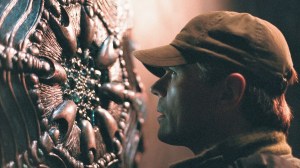Earlier today, when he announced via Twitter that he had walked off of his monthly DC books The Savage Hawkman, Grifter and Deathstroke, Rob Liefeld told fans to watch his Twitter feed for more information, and not to expect anything in the way of a “tell-all interview,” although he did joke that the New 52 section in his autobiography would have the potential to eclipse the Image chapters.Well, he’s off to a start already, telling fans that it was constantly fighting with editorial and DC’s habit of covering for people he didn’t perceive as doing their job that led him to put the pencil down and walk away.”[My p]ersonal goal of 13issues in 13 months was achieved at DC,” the artist tweeted, clarifying, “September to September.”That counts Hawk & Dove, a series he took on before assuming creative control of the titles he’s just left, and which DC cancelled when the “second wave” of New 52 titles came around. Still, by any count he got more than thirteen issues during that time, drawing all of Hawk & Dove and writing part of it as well, before taking on monthly writing or co-writing duties on three titles and pencils on another.As far as the actual reason for his departure, Liefeld says he’s got plenty of stories, and will share some soon, but that the general reasons were with editorial. A few of his tweets on the subject:
Videos by ComicBook.com
“I had at least 20 editorial battles and won 80% but those battles wear you down.”Everyone kept covering for another guy who kept slipping and tripping all over his deadlines. Excuse after excuse…then, silhouettes…”Just don’t believe I’m rewarding the guy who draws silhouettes after silhouettes and makes his inker draw his pages. Sorry.”
It’s not clear whether the artist of whom Liefeld is critical actually worked on one of his own titles or whether it’s just a situation Liefeld was aware of, so nobody rush to condemn any of the pencillers Liefeld has been working with. He promised more details on that particular score next week, which is likely to kick up another Twitter firestorm.For now, though, Liefeld is offering a nickel’s worth of free advice to other creators who find themselves considering offers to work for Marvel and DC:
“Freelancers, tell your editor he works for you, not the other way around. Routinely fire them to remind then you call the shots.”I did this and it gave me a extra 9 months…they cannot make books without talent.”And where it’s all headed is overseas talent anyways. Why do you think that they fly around doing new talent searches in foreign countries?”Protect yourself–don’t be a sheep. Remember that YOU make the books – have pride and say enough. You can make more money elsewhere.”If I haven’t made it perfectly clear let me re- affirm-I am not important to DC comics. Just a freelancer. Nothing I do will change anything.”Reason I went public hours after informing DC is because I did not want anyone controlling my news but me.”And, I loved all the work I did there regardless of the struggle. I think the DC 52 was/is positive for comics.”
Perhaps not surprisingly, his observation about overseas talent almost immediately drew the ire of David Macho, an agent representing a number of overseas artists including DC regulars Jesus Saiz and Daniel Acuña. Macho accused Liefeld of taking “cheap shots” and of characterizing his clients and others as the “cheaper models,” an argument Liefeld rejected, saying that “the cream rises to the top, no matter what the circumstances.”









